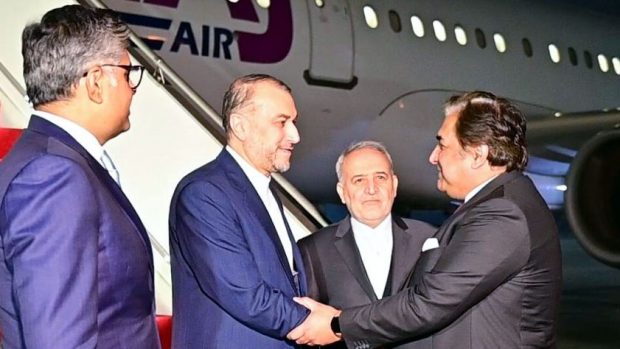Iran’s FM visits Islamabad for in-depth talks with Pakistan leaders

Pakistan officials receiving Iranian FM in Islamabad (Photo: Radio Pakistan website)
By Nasir Aijaz
The AsiaN Representative
ISLAMABAD: Foreign Minister of Iran Hossein Amir-Abdollahian arrived here in the wee hours of Monday January 29, 2024 at the invitation of Caretaker Foreign Minister Jalil Abbas Jilani.
On his arrival at the Nur Khan Airbase, the Iranian foreign minister was received by the Additional Foreign Secretary (Afghanistan and West Asia) of the Ministry of Foreign Affairs, Rahim Hayat Qureshi.
“During the visit, Foreign Minister Abdollahian will hold in-depth talks with Foreign Minister Jilani and call on Prime Minister Anwaar-ul-Haq Kakar,” according to a Foreign Office statement.
This high level visit comes after both the countries, in their joint press statement on January 22, had announced that the envoys of both the countries would return to their respective posts and that Iranian FM would visit Islamabad.
Earlier, the relations between both the countries were strained after Iran violated Pakistan’s airspace this month which followed Pakistan’s military strike inside Iran to target the hideouts of the Pakistan-origin terrorists.
The visit of the Iranian foreign minister is seen as a step towards normalization of bilateral ties. According to media reports, bringing to justice the killers of nine Pakistanis in Iran will be the most important point of negotiations.
The reports also said that Pakistan will reiterate its demand for an immediate need to investigate the incident and hold accountable those involved in the heinous crime.
Foreign ministers of Pakistan and Iran will also hold a joint press stakeout after talks today.
On January 16, Iran launched attacks in Balochistan claiming to target a militant outfit which left two children dead and injured three girls.
Pakistan on January 17 withdrew its ambassador from Iran and announced that it would not allow the Iranian envoy visiting his home country at that time to return to protest at a “blatant breach” of its sovereignty after Tehran said it launched missile attacks on militants’ bases in southwestern Pakistan.
The next day, on January 18, Pakistan launched strikes on terrorists’ hideouts inside Iran in a retaliatory attack two days after Tehran’s air strike which left two children dead and injured three girls.
In a statement, the Pakistan Army had said the hideouts used by terrorist militant organizations, namely Balochistan Liberation Army (BLA) and Balochistan Liberation Front (BLF), were successfully struck in an intelligence-based operation, code-named — “Marg Bar Sarmachar”.
On January 26, the envoys of Pakistan and Iran resumed duties in Tehran and Islamabad after a brief strain in diplomatic ties following cross-border tensions.
However, just a day after the resumption of diplomatic ties, at least nine Pakistani citizens were killed and three sustained injuries in a firing incident near the Pakistani border in Iran.
As per Iranian media, nine “foreigners” were slain in an armed attack in the country’s southeastern region near the border with Pakistan. The report also stated that “no group has claimed responsibility” for the attack.





















































